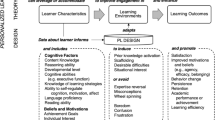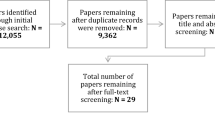Abstract
The purpose of this study was to examine the effect of a digitized podcast to deliver read-aloud testing accommodations on mobile devices to students with disabilities and reading difficulties. The total sample for this study included 47 middle school students with reading difficulties. Of the 47 students, 16 were identified as students with disabilities who received special education services. Participants were randomly assigned to three experimental testing conditions, standard administration, teacher-controlled read-aloud in traditional group delivery format, and student-controlled read-aloud delivered as a podcast and accessed on a mobile device, and given sample end-of-year science assessments. Based on a factorial analysis of variances, with test conditions and student status as the fixed factors, both student groups demonstrated statistically significant gains based on their testing conditions. Results support the use of podcast delivery as a viable alternative to the traditional teacher-delivered read-aloud test accommodation. Conclusions are discussed in the context of universal design for learning testing accommodations for future research and practice.


Similar content being viewed by others
References
American Educational Research Association (AERA), American Psychological Association (APA), the National Council on Measurement in Education (NCME) (1999) Standards for educational and psychological testing. AERA, Washington
Beddow PA, Elliott SN, Kettler RJ (2009) Test accessibility and modification inventory (TAMI) accessibility rating matrix. Vanderbilt University, Nashville
Bolt SE, Thurlow ML (2007) Item-level effects of the read-aloud accommodation for students with reading disabilities. Assess Eff Interv 33(1):15–28
Buzick H, Stone E (2014) A meta-analysis of research on the read aloud accommodation. Educ Meas Issues Pract 33(3):17–30
Carlsson F, Mørkbak MR, Olsen SB (2012) The first time is the hardest: a test of ordering effects in choice experiments. J Choice Model 5(2):19–37
Center for Applied Special Technology (2011) Universal design for learning (UDL) guidelines: full-text representation (Version 2.0). http://www.udlcenter.org/aboutudl/udlguidelines
Cline F, Cook LL, Stone E (2008) An examination of differential item functioning on grade 5 math and science assessments for students with disabilities. Paper presented at the 2008 Annual Meeting of the American Educational Research Association, New York, NY
Cohen J (1988) Statistical power analysis for the behavioral sciences. Erlbaum, Hillsdale
Cook LL, Eignor DR, Steinberg Y, Sawaki Y (2008) Using factor analysis to compare the internal structure of a state standards-based math assessment. Paper presented at the 2008 Annual Meeting of the American Educational Research Association, New York, NY
Cormier DC, Altman J, Shyyan V, Thurlow ML (2010). A summary of the research on the effects of test accommodations: 2007–2008. (Technical Report 56). National Center on Educational Outcomes, Minneapolis, MN
Dawson L, Venn M, Gunter PL (2000) The effects of teacher versus computer reading models. Behav Disord 25(2):105–113
Dolan RP, Rose DH (2000) Accurate assessment through universal design for learning. J Spec Educ Technol 15(4):47–51
Dolan RP, Hall TE, Banerjee M, Chun E, Strangman N (2005) Applying principles of universal design to test delivery: the effect of computer-based read aloud on test performance of high school students with learning disabilities. J Technol Learn Assess 3(7):3–31
Elbaum B (2007) Effects of an oral testing accommodation on the mathematics performance of secondary students with and without learning disabilities. J Spec Educ 40(4):218–229
Farmer ME, Klein R, Bryson SE (1992) Computer- assisted reading: effects of whole-word feedback on fluency and comprehension in readers with severe disabilities. Remedial Spec Educ 13(2):50–60
Fletcher JM, Francis DJ, Boudousquie A, Copeland K, Young V, Kalinowski S, Vaughn S (2006) Effects of accommodations on high stakes testing for students with reading disabilities. Except Child 72(2):136–150
Flowers C, Kim D, Lewis P, Davis CA (2011) A comparison of computer-based testing and pencil-and-paper testing for students with a read-aloud accommodation. J Spec Educ Technol 26(1):1–12
Fuchs LS (1999) Curriculum-based measurement: updates on its application in standards-based assessment systems. Council for Exceptional Children, Charlotte
Haladyna TM, Downing SM (2004) Construct-irrelevant variance in high-stakes testing. Educ Meas Issues Pract 23(1):17–27
Hebert BM, Murdock JY (1994) Comparing three computer-aided instruction output modes to teach vocabulary words to students with learning disabilities. Learn Disabil Res Pract 9(3):136–141
Hogarth RM, Einhorn HJ (1992) Order effects in belief updating: the belief-adjustment model. Cogn Psychol 24(1):1–55
Hollenbeck K, Rozek-Tedesco MA, Tindal G, Glasgow A (2000) An exploratory study of student-paced versus teacher-paced accommodations for large-scale math tests. J Spec Educ Technol 15(2):29–38
Individuals with Disabilities Education Improvement Act, 20 U.S.C. §1400 (2004)
Jablonski B, Potts E, Wiley A (2008) Providing access to assessment: how should IEP teams make decisions about accommodations? http://www.cec.sped.org/AM/Template.cfm?Section=CEC_Today1&TEMPLATE=/CM/ContentDisplay.cfm&CONTENTID=11472
Johnstone CJ, Altman J, Thurlow ML, Thompson SJ (2006) A summary of research on the effects of test accommodations: 2002 through 2004. (Technical Report No. 45). National Center on Educational Outcomes, Minneapolis, MN
Ketterlin-Geller LR, Alonzo J, Braun-Monegan J, Tindal G (2007a) Recommendations for accommodations: implications of (in)consistency. Remedial Spec Educ 28(4):194–206
Ketterlin-Geller LR, Yovanoff P, Tindal G (2007b) Developing a new paradigm for conducting research on accommodations in mathematics testing. Except Child 73(3):331–347
Kincaid JP, Fishburne RP, Rogers RL, Chissom BS (1975) Derivation of new readability formulas (Automated Readability Index, Fog Count, and Flesch Reading Ease Formula) for Navy enlisted personnel. (Research Brank Report 8-75). Chief of Naval Technical Training, Naval Air StationMemphis, Millington, Tenn
Laitusis C, Buzick H, Stone E, Hansen E, Hakkinen M (2012) Literature review of testing accommodations and accessibility tools for students with disabilities. Educ Test Serv, Princeton
Lamb RL, Annetta L (2013) The use of online modules and the effect on student outcomes in a high school chemistry class. J Sci Educ Technol 22(5):603–613
Lamb RL, Annetta L, Meldrum J, Vallett D (2012) Measuring science interest: Rasch validation of the science interest survey. Int J Sci Math Educ 10(3):643–668
Lamb RL, Vallett D, Annetta L (2014) Development of a short form measure of science and technology self-efficacy using Rasch analysis. J Sci Educ Technol 23(5):641–657
Landau S, Russell M, Gourgey K, Erin J, Cowan J (2003) Use of the talking tactile tablet in mathematics testing. J Vis Impair Blind 97(2):85–96
Li H (2014) The effects of read-aloud accommodations for students with and without disabilities: a meta-analysis. Educ Meas Issues Pract 33(3):3–16
McCullough CS (1995) Using computer technology to monitor student progress and remediate reading problems. Sch Psychol Rev 24(3):426–439
McKevitt BC, Elliott SN (2003) Effects and perceived consequences of using read-aloud and teacher-recommended testing accommodations on a reading achievement test. Sch Psychol Rev 32(4):583–600
Meloy L, Deville C, Frisbie DA (2002) The effect of a read aloud accommodation on test scores of students with and without a learning disability in reading. Remedial Spec Educ 23(4):248–255
Messick S (1989) Validity. In: Linn RL (ed) Educational measurement. Macmillan, New York
National Center for Educational Statistics (2006) The nation’s report card: national and state reports in science now available. http://nationsreportcard.gov/science_2005/
No Child Left Behind Act of 2001, Pub. L. No. 107-110, 115 Stat.1425 (2002)
Rose DH, Meyer A (2002) Teaching every student in the digital age: universal design for learning. Association for Supervision and Curriculum Development, Alexandria
Schörgendorfer A, Madden LV, Bathke AC (2011) Choosing appropriate covariance matrices in a nonparametric analysis of factorials in block designs. J Appl Stat 38(4):833–850
Steinberg J, Cline F, Sawaki Y (2008) Examining the factor structure of a state standards-based assessment of science for students with disabilities. Paper presented at the 2008 Annual Meeting of the American Educational Research Association, New York, NY
Strangman N, Dalton B (2005) Using technology to support struggling readers: a review of the research. In: Edyburn D, Higgins K, Boone R (eds) Handbook of special education technology research and practice. Knowledge by Design Inc, Whitefish Bay, pp 545–569
Temple C (2007) The effects of interactive read-alouds on the reading achievement of middle grade reading students in a core remedial program. (Doctoral dissertation). Retrieved from Dissertation Abstracts International. (Accession Order No. 3287381)
Thompson SJ, Johnstone CJ, Thurlow ML (2002) Universal design applied to large-scale assessments (Synthesis Report 44). National Center on Education Outcomes, Minneapolis, MN. http://www.cehd.umn.edu/NCEO/onlinepubs/synthesis44.html
Thurlow ML, Thompson SJ, Lazarus SS (2006) Considerations for the administration of tests to special needs students: accommodations, modifications, and more. In: Downing SM, Haladyna TM (eds) Handbook of test development. Lawrence Erlbaum, Mahwah, pp 653–673
Tindal G, Heath B, Hollenbeck K, Almond P, Harniss M (1998) Accommodating students with disabilities on large-scale tests: an experimental study. Except Child 64(4):439–450
VanGetson GR, Thurlow ML (2007) Nearing the target in disaggregated subgroup reporting to the public on 2004–2005 assessment results. (Technical Report 46). National Center on Educational Outcomes, Minneapolis, MN
Virginia Department of Education (2006) Guidelines for administering the read-aloud accommodation for standards of learning assessments. http://www.doe.virginia.gov/testing/participation/guidelines_read_aloud.pdf
Winter PC, Kopriva RJ, Chen C-S, Emick JE (2006) Exploring individual and item factors that affect assessment validity for diverse learners: results from a large-scale cognitive lab. Learn Individ Differ 16(4):267–276
Author information
Authors and Affiliations
Corresponding author
Rights and permissions
About this article
Cite this article
McMahon, D., Wright, R., Cihak, D.F. et al. Podcasts on Mobile Devices as a Read-Aloud Testing Accommodation in Middle School Science Assessment. J Sci Educ Technol 25, 263–273 (2016). https://doi.org/10.1007/s10956-015-9591-3
Published:
Issue Date:
DOI: https://doi.org/10.1007/s10956-015-9591-3




